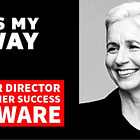1. Be The Go-To Person
Position yourself as a valuable asset your company can't afford to lose.
Expand your skills, take on new responsibilities, and become the person your manager wants to keep.
2. Shift Your Mindset
We all have a natural tendency to expect the worst.
Always thinking "It's too good to be true" or "We're going to lose it"
Instead, stay positive and motivate yourself and others to do their best.
3. Be a Leader
You don't need a job title to act as a leader. It’s a choice you make to take care of others before your own interests.
Give credit to your team, even if you’re the one who led the charge.
Own your mistakes, even if others were partly responsible.
4. Use The WIIFM Framework
When making requests, like asking for a raise, frame it in a way that benefits the company or your manager.
Show how your work will increase performance and profits, and then ask for a fair share.
P.S. The WIIFM is a powerful framework that best industry leaders like Catherine or Christine highly recommend too:
5. Stop Complaining
It's easy to point out problems, but true leaders always look for ways to fix them.
When you identify an issue, think of potential solutions first and only then bring it up.
6. Root for Others
Instead of pulling others down, focus on yourself and what YOU can do to succeed.
And then help your coworkers do the same along the way.
7. Look For Feedback
Both positive and negative
Adopt the growth mindset Carol Dweck refers to in her best-seller book.
Use it as an opportunity to improve and grow.
Don't get defensive, ask questions and learn.
8. Celebrate Small Wins
Don't just focus on the big goals.
Take the time to celebrate even the smallest wins.
9. Communicate Clear, Not Clever
Get straight to the point—it saves everyone's time
Cut out any fluff.
And any details that if you deleted wouldn’t change the core of your message.
10. Keep It Simple
“If you can't explain it simply, then you don't understand it well enough.”
-Albert Einstein.
Use simple language.
Avoid industry jargon or complex technical terms.
Explain things as if you were talking to someone without your expertise.
11. Stay Humble
Ask for help whenever needed.
Recognize that no one has all the answers and that it’s okay not to know everything.
12. Get Creative
Creative people find new solutions to old problems.
Think outside the box and don't fear failure.
Never say “We’ve always done it this way”
13. Manage Your Time
Time management is life management.
Prioritize your tasks, set clear goals, and break your work into manageable pieces—one step at a time.
14. Always On Schedule
Being on time shows respect for others' time and builds trust.
Plan your schedule with safety buffers—aim to be a few minutes early.
15. Know Yourself
Double down on your strengths.
Work on your weaknesses.
Reflect on your experiences and ask for genuine feedback.
16. Be Professional
A professional attitude earns you respect and makes others take you seriously.
Treat everyone with respect.
Say what you mean, and do what you say.
Commit, and maintain a high standard of ethics even when no one is watching.
17. Build Empathy
Connect with others on a deeper level.
Practice active listening and try to see things from others' perspectives.
And That’s It.
The key is to focus on solutions, not just problems.
When you do that, new opportunities will start opening up.
Any other tips that have worked well for you? Please share them for an opportunity to see your name and recommendation added to this list.
Have an awesome productive week ahead!
-Hakan.
New Resources This Week (Exclusive To My Paid Subscribers)
Footnotes:
Visit The CS Café Store for self-help guides and resources.
Join the CS Café Slack community. Ask questions, get answers, communicate with your peers, and boost your career.
Sponsor The CS Café Newsletter and reach our growing community of over 2,700+ CS pros and industry leaders looking for top solutions to accelerate their success.
Share Your Story for a spotlight interview opportunity in my newsletter.
Need more help? Book a free discovery call with me.












